Cloud based ERP Systems in the Cloud Name of the Student Name of the University
VerifiedAdded on 2023/04/22
|18
|5055
|267
AI Summary
Contribute Materials
Your contribution can guide someone’s learning journey. Share your
documents today.

Running head: ERP SYSTEMS IN THE CLOUD
ERP Systems in the Cloud
Name of the Student
Name of the University
Author Note
ERP Systems in the Cloud
Name of the Student
Name of the University
Author Note
Secure Best Marks with AI Grader
Need help grading? Try our AI Grader for instant feedback on your assignments.
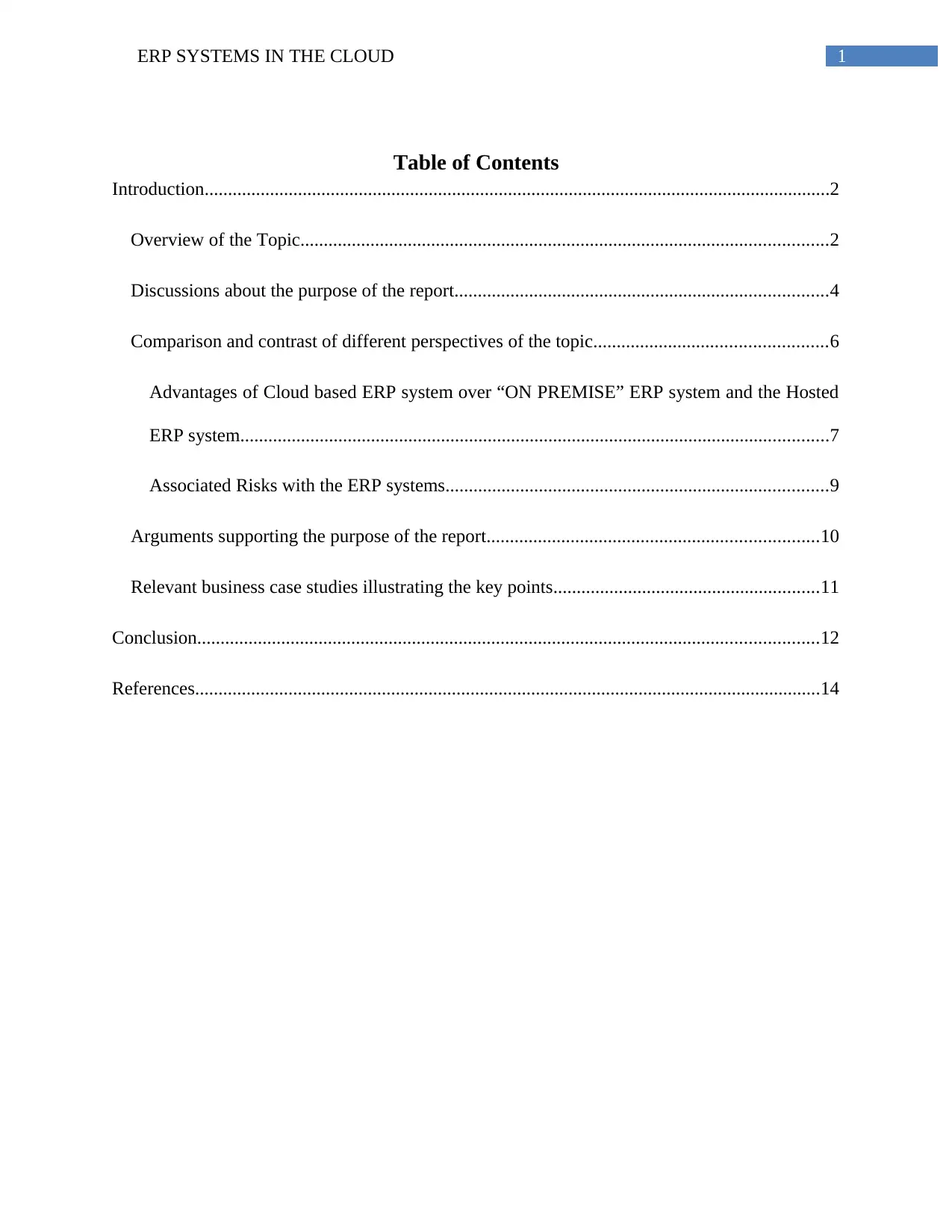
1ERP SYSTEMS IN THE CLOUD
Table of Contents
Introduction......................................................................................................................................2
Overview of the Topic.................................................................................................................2
Discussions about the purpose of the report................................................................................4
Comparison and contrast of different perspectives of the topic..................................................6
Advantages of Cloud based ERP system over “ON PREMISE” ERP system and the Hosted
ERP system..............................................................................................................................7
Associated Risks with the ERP systems..................................................................................9
Arguments supporting the purpose of the report.......................................................................10
Relevant business case studies illustrating the key points.........................................................11
Conclusion.....................................................................................................................................12
References......................................................................................................................................14
Table of Contents
Introduction......................................................................................................................................2
Overview of the Topic.................................................................................................................2
Discussions about the purpose of the report................................................................................4
Comparison and contrast of different perspectives of the topic..................................................6
Advantages of Cloud based ERP system over “ON PREMISE” ERP system and the Hosted
ERP system..............................................................................................................................7
Associated Risks with the ERP systems..................................................................................9
Arguments supporting the purpose of the report.......................................................................10
Relevant business case studies illustrating the key points.........................................................11
Conclusion.....................................................................................................................................12
References......................................................................................................................................14
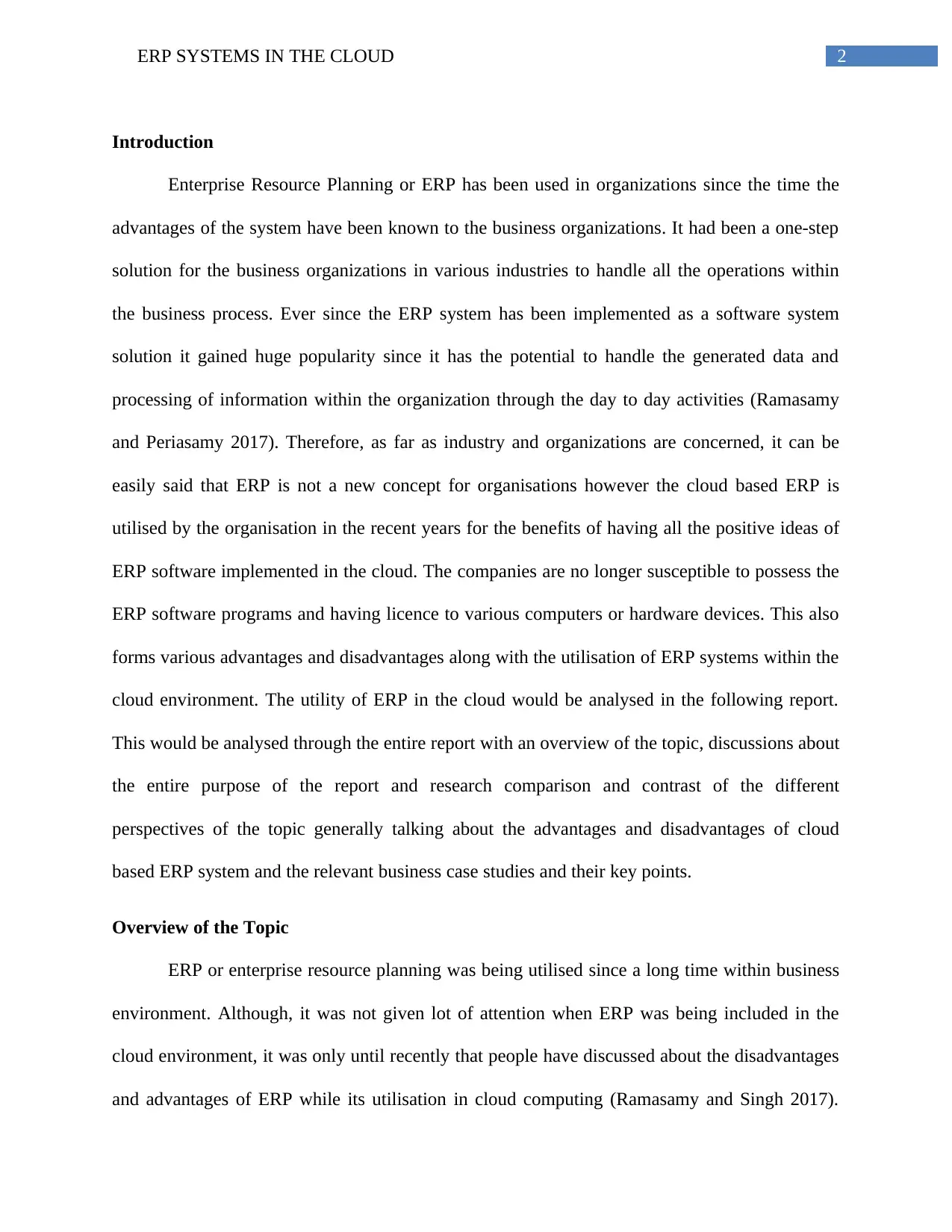
2ERP SYSTEMS IN THE CLOUD
Introduction
Enterprise Resource Planning or ERP has been used in organizations since the time the
advantages of the system have been known to the business organizations. It had been a one-step
solution for the business organizations in various industries to handle all the operations within
the business process. Ever since the ERP system has been implemented as a software system
solution it gained huge popularity since it has the potential to handle the generated data and
processing of information within the organization through the day to day activities (Ramasamy
and Periasamy 2017). Therefore, as far as industry and organizations are concerned, it can be
easily said that ERP is not a new concept for organisations however the cloud based ERP is
utilised by the organisation in the recent years for the benefits of having all the positive ideas of
ERP software implemented in the cloud. The companies are no longer susceptible to possess the
ERP software programs and having licence to various computers or hardware devices. This also
forms various advantages and disadvantages along with the utilisation of ERP systems within the
cloud environment. The utility of ERP in the cloud would be analysed in the following report.
This would be analysed through the entire report with an overview of the topic, discussions about
the entire purpose of the report and research comparison and contrast of the different
perspectives of the topic generally talking about the advantages and disadvantages of cloud
based ERP system and the relevant business case studies and their key points.
Overview of the Topic
ERP or enterprise resource planning was being utilised since a long time within business
environment. Although, it was not given lot of attention when ERP was being included in the
cloud environment, it was only until recently that people have discussed about the disadvantages
and advantages of ERP while its utilisation in cloud computing (Ramasamy and Singh 2017).
Introduction
Enterprise Resource Planning or ERP has been used in organizations since the time the
advantages of the system have been known to the business organizations. It had been a one-step
solution for the business organizations in various industries to handle all the operations within
the business process. Ever since the ERP system has been implemented as a software system
solution it gained huge popularity since it has the potential to handle the generated data and
processing of information within the organization through the day to day activities (Ramasamy
and Periasamy 2017). Therefore, as far as industry and organizations are concerned, it can be
easily said that ERP is not a new concept for organisations however the cloud based ERP is
utilised by the organisation in the recent years for the benefits of having all the positive ideas of
ERP software implemented in the cloud. The companies are no longer susceptible to possess the
ERP software programs and having licence to various computers or hardware devices. This also
forms various advantages and disadvantages along with the utilisation of ERP systems within the
cloud environment. The utility of ERP in the cloud would be analysed in the following report.
This would be analysed through the entire report with an overview of the topic, discussions about
the entire purpose of the report and research comparison and contrast of the different
perspectives of the topic generally talking about the advantages and disadvantages of cloud
based ERP system and the relevant business case studies and their key points.
Overview of the Topic
ERP or enterprise resource planning was being utilised since a long time within business
environment. Although, it was not given lot of attention when ERP was being included in the
cloud environment, it was only until recently that people have discussed about the disadvantages
and advantages of ERP while its utilisation in cloud computing (Ramasamy and Singh 2017).
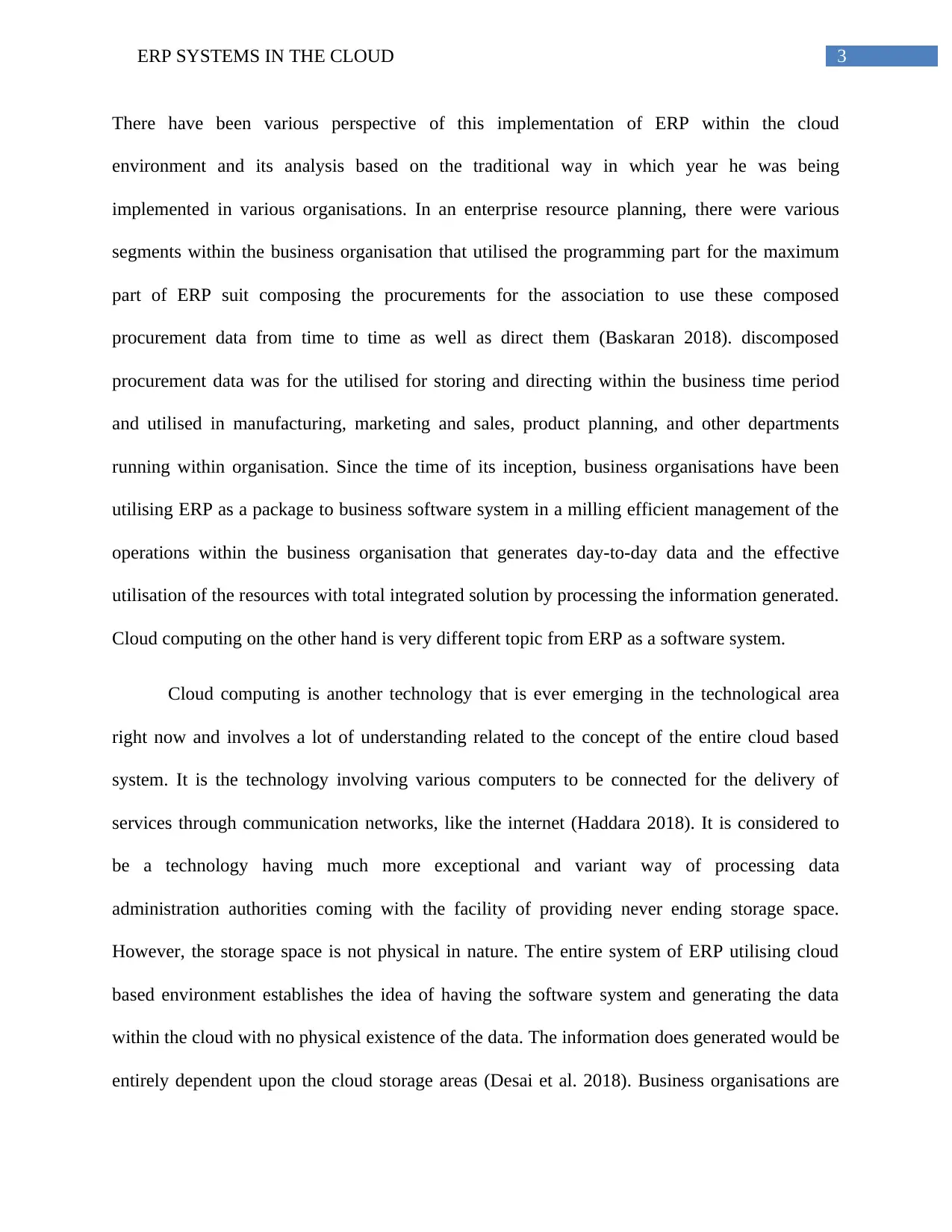
3ERP SYSTEMS IN THE CLOUD
There have been various perspective of this implementation of ERP within the cloud
environment and its analysis based on the traditional way in which year he was being
implemented in various organisations. In an enterprise resource planning, there were various
segments within the business organisation that utilised the programming part for the maximum
part of ERP suit composing the procurements for the association to use these composed
procurement data from time to time as well as direct them (Baskaran 2018). discomposed
procurement data was for the utilised for storing and directing within the business time period
and utilised in manufacturing, marketing and sales, product planning, and other departments
running within organisation. Since the time of its inception, business organisations have been
utilising ERP as a package to business software system in a milling efficient management of the
operations within the business organisation that generates day-to-day data and the effective
utilisation of the resources with total integrated solution by processing the information generated.
Cloud computing on the other hand is very different topic from ERP as a software system.
Cloud computing is another technology that is ever emerging in the technological area
right now and involves a lot of understanding related to the concept of the entire cloud based
system. It is the technology involving various computers to be connected for the delivery of
services through communication networks, like the internet (Haddara 2018). It is considered to
be a technology having much more exceptional and variant way of processing data
administration authorities coming with the facility of providing never ending storage space.
However, the storage space is not physical in nature. The entire system of ERP utilising cloud
based environment establishes the idea of having the software system and generating the data
within the cloud with no physical existence of the data. The information does generated would be
entirely dependent upon the cloud storage areas (Desai et al. 2018). Business organisations are
There have been various perspective of this implementation of ERP within the cloud
environment and its analysis based on the traditional way in which year he was being
implemented in various organisations. In an enterprise resource planning, there were various
segments within the business organisation that utilised the programming part for the maximum
part of ERP suit composing the procurements for the association to use these composed
procurement data from time to time as well as direct them (Baskaran 2018). discomposed
procurement data was for the utilised for storing and directing within the business time period
and utilised in manufacturing, marketing and sales, product planning, and other departments
running within organisation. Since the time of its inception, business organisations have been
utilising ERP as a package to business software system in a milling efficient management of the
operations within the business organisation that generates day-to-day data and the effective
utilisation of the resources with total integrated solution by processing the information generated.
Cloud computing on the other hand is very different topic from ERP as a software system.
Cloud computing is another technology that is ever emerging in the technological area
right now and involves a lot of understanding related to the concept of the entire cloud based
system. It is the technology involving various computers to be connected for the delivery of
services through communication networks, like the internet (Haddara 2018). It is considered to
be a technology having much more exceptional and variant way of processing data
administration authorities coming with the facility of providing never ending storage space.
However, the storage space is not physical in nature. The entire system of ERP utilising cloud
based environment establishes the idea of having the software system and generating the data
within the cloud with no physical existence of the data. The information does generated would be
entirely dependent upon the cloud storage areas (Desai et al. 2018). Business organisations are
Secure Best Marks with AI Grader
Need help grading? Try our AI Grader for instant feedback on your assignments.
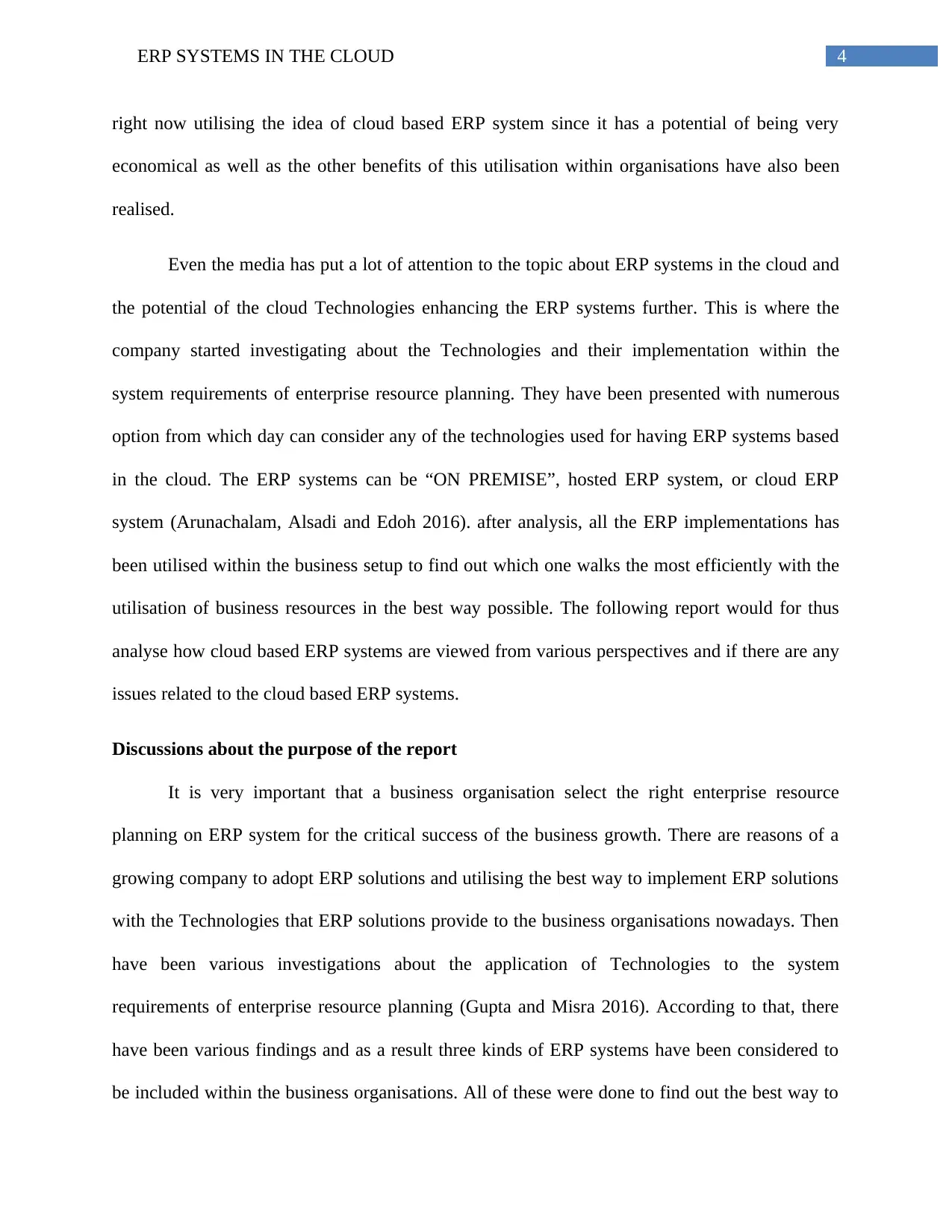
4ERP SYSTEMS IN THE CLOUD
right now utilising the idea of cloud based ERP system since it has a potential of being very
economical as well as the other benefits of this utilisation within organisations have also been
realised.
Even the media has put a lot of attention to the topic about ERP systems in the cloud and
the potential of the cloud Technologies enhancing the ERP systems further. This is where the
company started investigating about the Technologies and their implementation within the
system requirements of enterprise resource planning. They have been presented with numerous
option from which day can consider any of the technologies used for having ERP systems based
in the cloud. The ERP systems can be “ON PREMISE”, hosted ERP system, or cloud ERP
system (Arunachalam, Alsadi and Edoh 2016). after analysis, all the ERP implementations has
been utilised within the business setup to find out which one walks the most efficiently with the
utilisation of business resources in the best way possible. The following report would for thus
analyse how cloud based ERP systems are viewed from various perspectives and if there are any
issues related to the cloud based ERP systems.
Discussions about the purpose of the report
It is very important that a business organisation select the right enterprise resource
planning on ERP system for the critical success of the business growth. There are reasons of a
growing company to adopt ERP solutions and utilising the best way to implement ERP solutions
with the Technologies that ERP solutions provide to the business organisations nowadays. Then
have been various investigations about the application of Technologies to the system
requirements of enterprise resource planning (Gupta and Misra 2016). According to that, there
have been various findings and as a result three kinds of ERP systems have been considered to
be included within the business organisations. All of these were done to find out the best way to
right now utilising the idea of cloud based ERP system since it has a potential of being very
economical as well as the other benefits of this utilisation within organisations have also been
realised.
Even the media has put a lot of attention to the topic about ERP systems in the cloud and
the potential of the cloud Technologies enhancing the ERP systems further. This is where the
company started investigating about the Technologies and their implementation within the
system requirements of enterprise resource planning. They have been presented with numerous
option from which day can consider any of the technologies used for having ERP systems based
in the cloud. The ERP systems can be “ON PREMISE”, hosted ERP system, or cloud ERP
system (Arunachalam, Alsadi and Edoh 2016). after analysis, all the ERP implementations has
been utilised within the business setup to find out which one walks the most efficiently with the
utilisation of business resources in the best way possible. The following report would for thus
analyse how cloud based ERP systems are viewed from various perspectives and if there are any
issues related to the cloud based ERP systems.
Discussions about the purpose of the report
It is very important that a business organisation select the right enterprise resource
planning on ERP system for the critical success of the business growth. There are reasons of a
growing company to adopt ERP solutions and utilising the best way to implement ERP solutions
with the Technologies that ERP solutions provide to the business organisations nowadays. Then
have been various investigations about the application of Technologies to the system
requirements of enterprise resource planning (Gupta and Misra 2016). According to that, there
have been various findings and as a result three kinds of ERP systems have been considered to
be included within the business organisations. All of these were done to find out the best way to
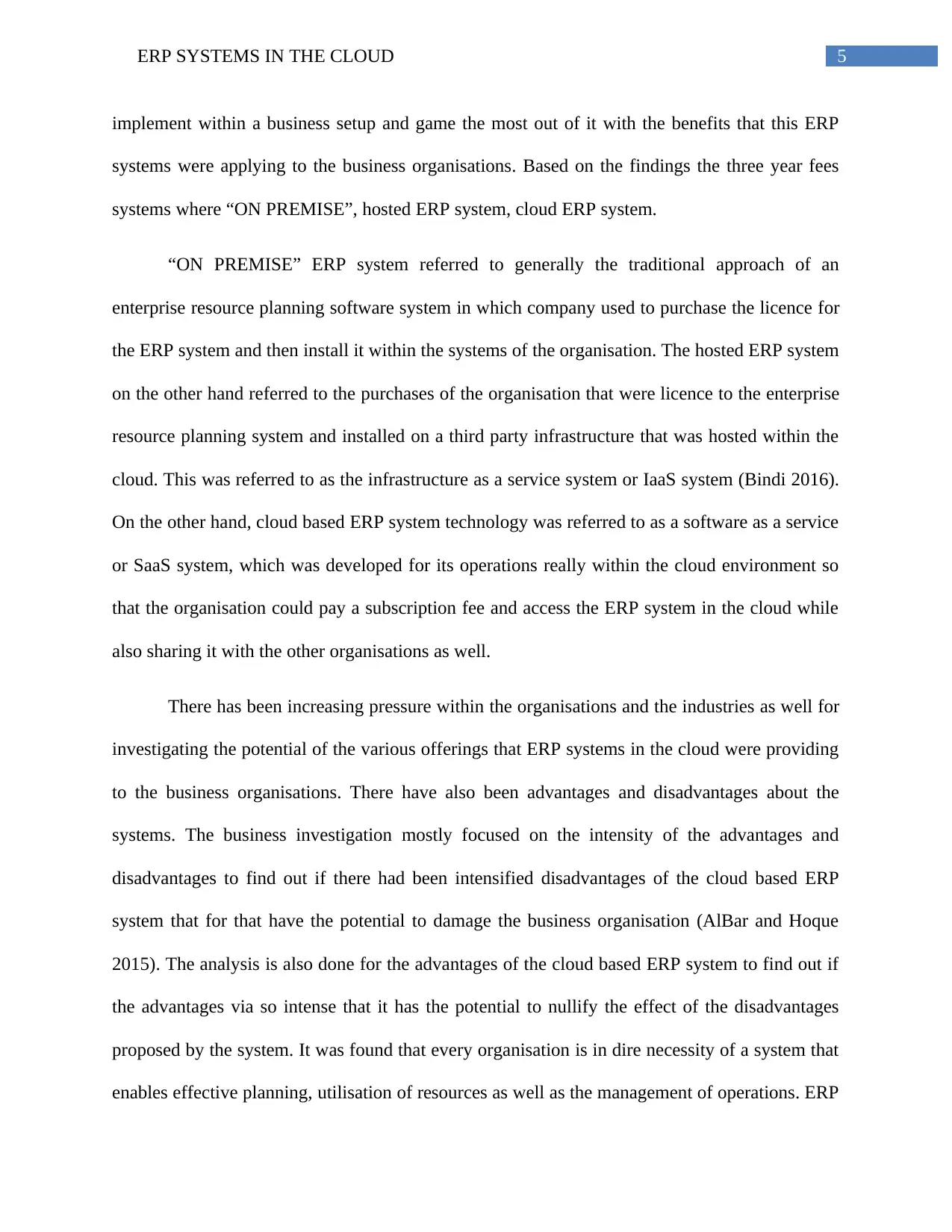
5ERP SYSTEMS IN THE CLOUD
implement within a business setup and game the most out of it with the benefits that this ERP
systems were applying to the business organisations. Based on the findings the three year fees
systems where “ON PREMISE”, hosted ERP system, cloud ERP system.
“ON PREMISE” ERP system referred to generally the traditional approach of an
enterprise resource planning software system in which company used to purchase the licence for
the ERP system and then install it within the systems of the organisation. The hosted ERP system
on the other hand referred to the purchases of the organisation that were licence to the enterprise
resource planning system and installed on a third party infrastructure that was hosted within the
cloud. This was referred to as the infrastructure as a service system or IaaS system (Bindi 2016).
On the other hand, cloud based ERP system technology was referred to as a software as a service
or SaaS system, which was developed for its operations really within the cloud environment so
that the organisation could pay a subscription fee and access the ERP system in the cloud while
also sharing it with the other organisations as well.
There has been increasing pressure within the organisations and the industries as well for
investigating the potential of the various offerings that ERP systems in the cloud were providing
to the business organisations. There have also been advantages and disadvantages about the
systems. The business investigation mostly focused on the intensity of the advantages and
disadvantages to find out if there had been intensified disadvantages of the cloud based ERP
system that for that have the potential to damage the business organisation (AlBar and Hoque
2015). The analysis is also done for the advantages of the cloud based ERP system to find out if
the advantages via so intense that it has the potential to nullify the effect of the disadvantages
proposed by the system. It was found that every organisation is in dire necessity of a system that
enables effective planning, utilisation of resources as well as the management of operations. ERP
implement within a business setup and game the most out of it with the benefits that this ERP
systems were applying to the business organisations. Based on the findings the three year fees
systems where “ON PREMISE”, hosted ERP system, cloud ERP system.
“ON PREMISE” ERP system referred to generally the traditional approach of an
enterprise resource planning software system in which company used to purchase the licence for
the ERP system and then install it within the systems of the organisation. The hosted ERP system
on the other hand referred to the purchases of the organisation that were licence to the enterprise
resource planning system and installed on a third party infrastructure that was hosted within the
cloud. This was referred to as the infrastructure as a service system or IaaS system (Bindi 2016).
On the other hand, cloud based ERP system technology was referred to as a software as a service
or SaaS system, which was developed for its operations really within the cloud environment so
that the organisation could pay a subscription fee and access the ERP system in the cloud while
also sharing it with the other organisations as well.
There has been increasing pressure within the organisations and the industries as well for
investigating the potential of the various offerings that ERP systems in the cloud were providing
to the business organisations. There have also been advantages and disadvantages about the
systems. The business investigation mostly focused on the intensity of the advantages and
disadvantages to find out if there had been intensified disadvantages of the cloud based ERP
system that for that have the potential to damage the business organisation (AlBar and Hoque
2015). The analysis is also done for the advantages of the cloud based ERP system to find out if
the advantages via so intense that it has the potential to nullify the effect of the disadvantages
proposed by the system. It was found that every organisation is in dire necessity of a system that
enables effective planning, utilisation of resources as well as the management of operations. ERP
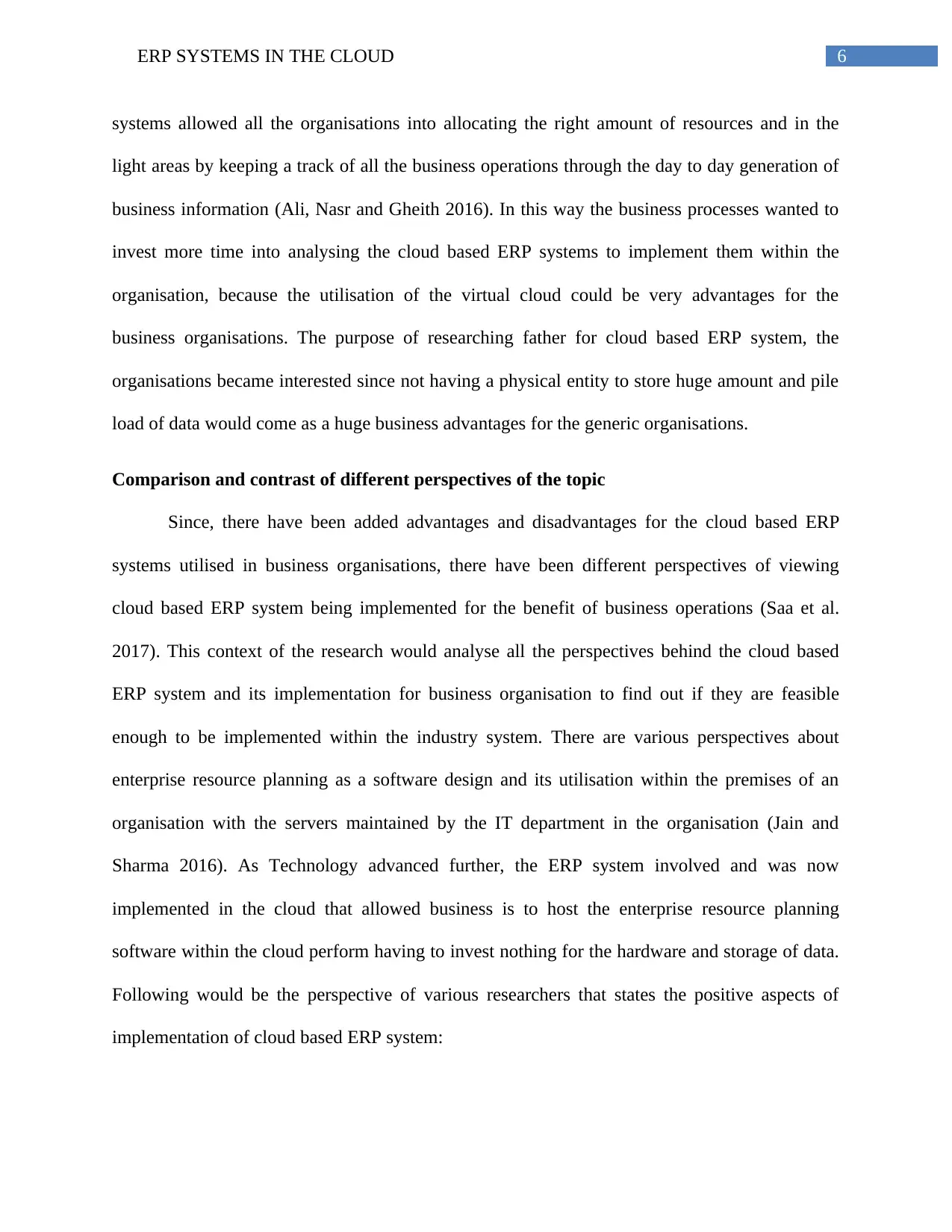
6ERP SYSTEMS IN THE CLOUD
systems allowed all the organisations into allocating the right amount of resources and in the
light areas by keeping a track of all the business operations through the day to day generation of
business information (Ali, Nasr and Gheith 2016). In this way the business processes wanted to
invest more time into analysing the cloud based ERP systems to implement them within the
organisation, because the utilisation of the virtual cloud could be very advantages for the
business organisations. The purpose of researching father for cloud based ERP system, the
organisations became interested since not having a physical entity to store huge amount and pile
load of data would come as a huge business advantages for the generic organisations.
Comparison and contrast of different perspectives of the topic
Since, there have been added advantages and disadvantages for the cloud based ERP
systems utilised in business organisations, there have been different perspectives of viewing
cloud based ERP system being implemented for the benefit of business operations (Saa et al.
2017). This context of the research would analyse all the perspectives behind the cloud based
ERP system and its implementation for business organisation to find out if they are feasible
enough to be implemented within the industry system. There are various perspectives about
enterprise resource planning as a software design and its utilisation within the premises of an
organisation with the servers maintained by the IT department in the organisation (Jain and
Sharma 2016). As Technology advanced further, the ERP system involved and was now
implemented in the cloud that allowed business is to host the enterprise resource planning
software within the cloud perform having to invest nothing for the hardware and storage of data.
Following would be the perspective of various researchers that states the positive aspects of
implementation of cloud based ERP system:
systems allowed all the organisations into allocating the right amount of resources and in the
light areas by keeping a track of all the business operations through the day to day generation of
business information (Ali, Nasr and Gheith 2016). In this way the business processes wanted to
invest more time into analysing the cloud based ERP systems to implement them within the
organisation, because the utilisation of the virtual cloud could be very advantages for the
business organisations. The purpose of researching father for cloud based ERP system, the
organisations became interested since not having a physical entity to store huge amount and pile
load of data would come as a huge business advantages for the generic organisations.
Comparison and contrast of different perspectives of the topic
Since, there have been added advantages and disadvantages for the cloud based ERP
systems utilised in business organisations, there have been different perspectives of viewing
cloud based ERP system being implemented for the benefit of business operations (Saa et al.
2017). This context of the research would analyse all the perspectives behind the cloud based
ERP system and its implementation for business organisation to find out if they are feasible
enough to be implemented within the industry system. There are various perspectives about
enterprise resource planning as a software design and its utilisation within the premises of an
organisation with the servers maintained by the IT department in the organisation (Jain and
Sharma 2016). As Technology advanced further, the ERP system involved and was now
implemented in the cloud that allowed business is to host the enterprise resource planning
software within the cloud perform having to invest nothing for the hardware and storage of data.
Following would be the perspective of various researchers that states the positive aspects of
implementation of cloud based ERP system:
Paraphrase This Document
Need a fresh take? Get an instant paraphrase of this document with our AI Paraphraser
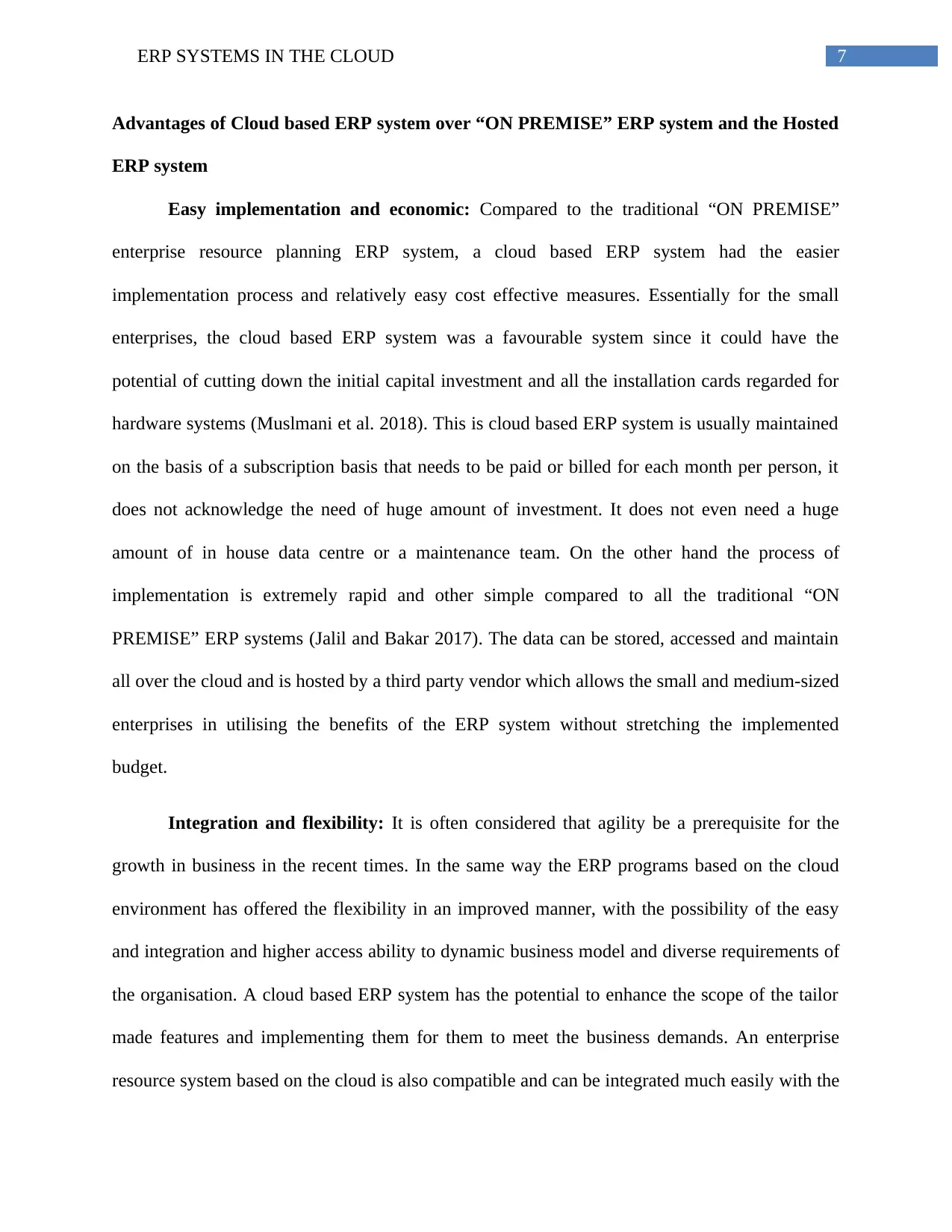
7ERP SYSTEMS IN THE CLOUD
Advantages of Cloud based ERP system over “ON PREMISE” ERP system and the Hosted
ERP system
Easy implementation and economic: Compared to the traditional “ON PREMISE”
enterprise resource planning ERP system, a cloud based ERP system had the easier
implementation process and relatively easy cost effective measures. Essentially for the small
enterprises, the cloud based ERP system was a favourable system since it could have the
potential of cutting down the initial capital investment and all the installation cards regarded for
hardware systems (Muslmani et al. 2018). This is cloud based ERP system is usually maintained
on the basis of a subscription basis that needs to be paid or billed for each month per person, it
does not acknowledge the need of huge amount of investment. It does not even need a huge
amount of in house data centre or a maintenance team. On the other hand the process of
implementation is extremely rapid and other simple compared to all the traditional “ON
PREMISE” ERP systems (Jalil and Bakar 2017). The data can be stored, accessed and maintain
all over the cloud and is hosted by a third party vendor which allows the small and medium-sized
enterprises in utilising the benefits of the ERP system without stretching the implemented
budget.
Integration and flexibility: It is often considered that agility be a prerequisite for the
growth in business in the recent times. In the same way the ERP programs based on the cloud
environment has offered the flexibility in an improved manner, with the possibility of the easy
and integration and higher access ability to dynamic business model and diverse requirements of
the organisation. A cloud based ERP system has the potential to enhance the scope of the tailor
made features and implementing them for them to meet the business demands. An enterprise
resource system based on the cloud is also compatible and can be integrated much easily with the
Advantages of Cloud based ERP system over “ON PREMISE” ERP system and the Hosted
ERP system
Easy implementation and economic: Compared to the traditional “ON PREMISE”
enterprise resource planning ERP system, a cloud based ERP system had the easier
implementation process and relatively easy cost effective measures. Essentially for the small
enterprises, the cloud based ERP system was a favourable system since it could have the
potential of cutting down the initial capital investment and all the installation cards regarded for
hardware systems (Muslmani et al. 2018). This is cloud based ERP system is usually maintained
on the basis of a subscription basis that needs to be paid or billed for each month per person, it
does not acknowledge the need of huge amount of investment. It does not even need a huge
amount of in house data centre or a maintenance team. On the other hand the process of
implementation is extremely rapid and other simple compared to all the traditional “ON
PREMISE” ERP systems (Jalil and Bakar 2017). The data can be stored, accessed and maintain
all over the cloud and is hosted by a third party vendor which allows the small and medium-sized
enterprises in utilising the benefits of the ERP system without stretching the implemented
budget.
Integration and flexibility: It is often considered that agility be a prerequisite for the
growth in business in the recent times. In the same way the ERP programs based on the cloud
environment has offered the flexibility in an improved manner, with the possibility of the easy
and integration and higher access ability to dynamic business model and diverse requirements of
the organisation. A cloud based ERP system has the potential to enhance the scope of the tailor
made features and implementing them for them to meet the business demands. An enterprise
resource system based on the cloud is also compatible and can be integrated much easily with the
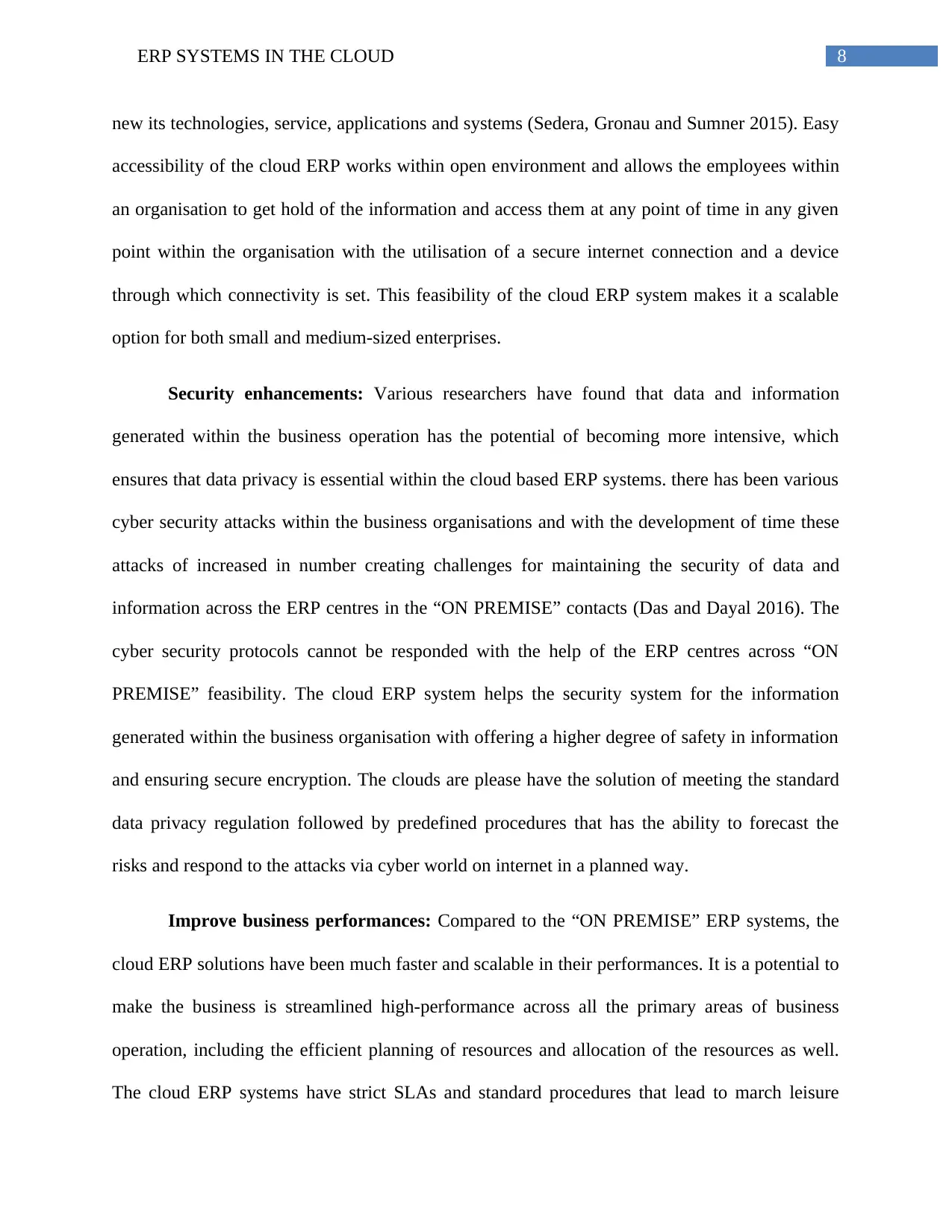
8ERP SYSTEMS IN THE CLOUD
new its technologies, service, applications and systems (Sedera, Gronau and Sumner 2015). Easy
accessibility of the cloud ERP works within open environment and allows the employees within
an organisation to get hold of the information and access them at any point of time in any given
point within the organisation with the utilisation of a secure internet connection and a device
through which connectivity is set. This feasibility of the cloud ERP system makes it a scalable
option for both small and medium-sized enterprises.
Security enhancements: Various researchers have found that data and information
generated within the business operation has the potential of becoming more intensive, which
ensures that data privacy is essential within the cloud based ERP systems. there has been various
cyber security attacks within the business organisations and with the development of time these
attacks of increased in number creating challenges for maintaining the security of data and
information across the ERP centres in the “ON PREMISE” contacts (Das and Dayal 2016). The
cyber security protocols cannot be responded with the help of the ERP centres across “ON
PREMISE” feasibility. The cloud ERP system helps the security system for the information
generated within the business organisation with offering a higher degree of safety in information
and ensuring secure encryption. The clouds are please have the solution of meeting the standard
data privacy regulation followed by predefined procedures that has the ability to forecast the
risks and respond to the attacks via cyber world on internet in a planned way.
Improve business performances: Compared to the “ON PREMISE” ERP systems, the
cloud ERP solutions have been much faster and scalable in their performances. It is a potential to
make the business is streamlined high-performance across all the primary areas of business
operation, including the efficient planning of resources and allocation of the resources as well.
The cloud ERP systems have strict SLAs and standard procedures that lead to march leisure
new its technologies, service, applications and systems (Sedera, Gronau and Sumner 2015). Easy
accessibility of the cloud ERP works within open environment and allows the employees within
an organisation to get hold of the information and access them at any point of time in any given
point within the organisation with the utilisation of a secure internet connection and a device
through which connectivity is set. This feasibility of the cloud ERP system makes it a scalable
option for both small and medium-sized enterprises.
Security enhancements: Various researchers have found that data and information
generated within the business operation has the potential of becoming more intensive, which
ensures that data privacy is essential within the cloud based ERP systems. there has been various
cyber security attacks within the business organisations and with the development of time these
attacks of increased in number creating challenges for maintaining the security of data and
information across the ERP centres in the “ON PREMISE” contacts (Das and Dayal 2016). The
cyber security protocols cannot be responded with the help of the ERP centres across “ON
PREMISE” feasibility. The cloud ERP system helps the security system for the information
generated within the business organisation with offering a higher degree of safety in information
and ensuring secure encryption. The clouds are please have the solution of meeting the standard
data privacy regulation followed by predefined procedures that has the ability to forecast the
risks and respond to the attacks via cyber world on internet in a planned way.
Improve business performances: Compared to the “ON PREMISE” ERP systems, the
cloud ERP solutions have been much faster and scalable in their performances. It is a potential to
make the business is streamlined high-performance across all the primary areas of business
operation, including the efficient planning of resources and allocation of the resources as well.
The cloud ERP systems have strict SLAs and standard procedures that lead to march leisure
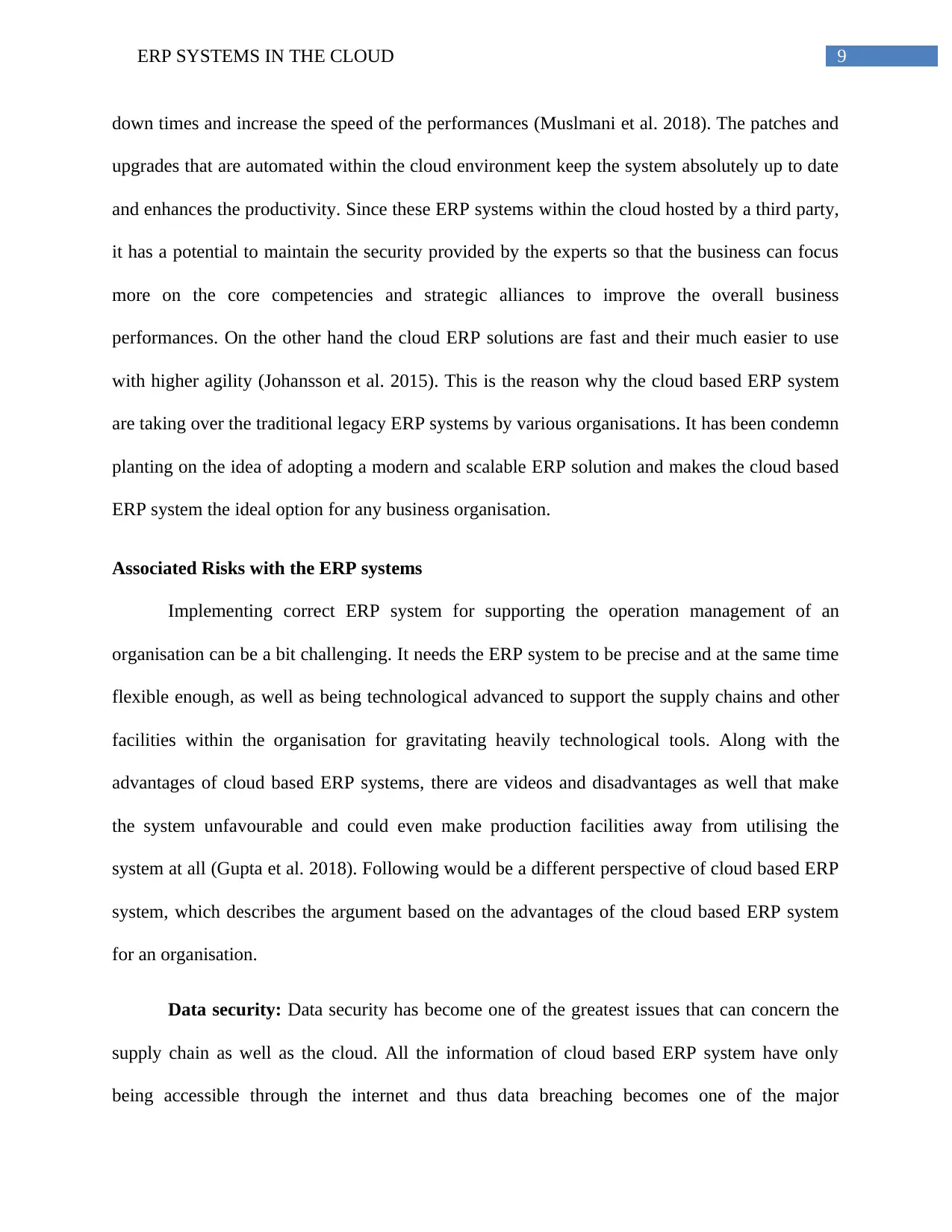
9ERP SYSTEMS IN THE CLOUD
down times and increase the speed of the performances (Muslmani et al. 2018). The patches and
upgrades that are automated within the cloud environment keep the system absolutely up to date
and enhances the productivity. Since these ERP systems within the cloud hosted by a third party,
it has a potential to maintain the security provided by the experts so that the business can focus
more on the core competencies and strategic alliances to improve the overall business
performances. On the other hand the cloud ERP solutions are fast and their much easier to use
with higher agility (Johansson et al. 2015). This is the reason why the cloud based ERP system
are taking over the traditional legacy ERP systems by various organisations. It has been condemn
planting on the idea of adopting a modern and scalable ERP solution and makes the cloud based
ERP system the ideal option for any business organisation.
Associated Risks with the ERP systems
Implementing correct ERP system for supporting the operation management of an
organisation can be a bit challenging. It needs the ERP system to be precise and at the same time
flexible enough, as well as being technological advanced to support the supply chains and other
facilities within the organisation for gravitating heavily technological tools. Along with the
advantages of cloud based ERP systems, there are videos and disadvantages as well that make
the system unfavourable and could even make production facilities away from utilising the
system at all (Gupta et al. 2018). Following would be a different perspective of cloud based ERP
system, which describes the argument based on the advantages of the cloud based ERP system
for an organisation.
Data security: Data security has become one of the greatest issues that can concern the
supply chain as well as the cloud. All the information of cloud based ERP system have only
being accessible through the internet and thus data breaching becomes one of the major
down times and increase the speed of the performances (Muslmani et al. 2018). The patches and
upgrades that are automated within the cloud environment keep the system absolutely up to date
and enhances the productivity. Since these ERP systems within the cloud hosted by a third party,
it has a potential to maintain the security provided by the experts so that the business can focus
more on the core competencies and strategic alliances to improve the overall business
performances. On the other hand the cloud ERP solutions are fast and their much easier to use
with higher agility (Johansson et al. 2015). This is the reason why the cloud based ERP system
are taking over the traditional legacy ERP systems by various organisations. It has been condemn
planting on the idea of adopting a modern and scalable ERP solution and makes the cloud based
ERP system the ideal option for any business organisation.
Associated Risks with the ERP systems
Implementing correct ERP system for supporting the operation management of an
organisation can be a bit challenging. It needs the ERP system to be precise and at the same time
flexible enough, as well as being technological advanced to support the supply chains and other
facilities within the organisation for gravitating heavily technological tools. Along with the
advantages of cloud based ERP systems, there are videos and disadvantages as well that make
the system unfavourable and could even make production facilities away from utilising the
system at all (Gupta et al. 2018). Following would be a different perspective of cloud based ERP
system, which describes the argument based on the advantages of the cloud based ERP system
for an organisation.
Data security: Data security has become one of the greatest issues that can concern the
supply chain as well as the cloud. All the information of cloud based ERP system have only
being accessible through the internet and thus data breaching becomes one of the major
Secure Best Marks with AI Grader
Need help grading? Try our AI Grader for instant feedback on your assignments.
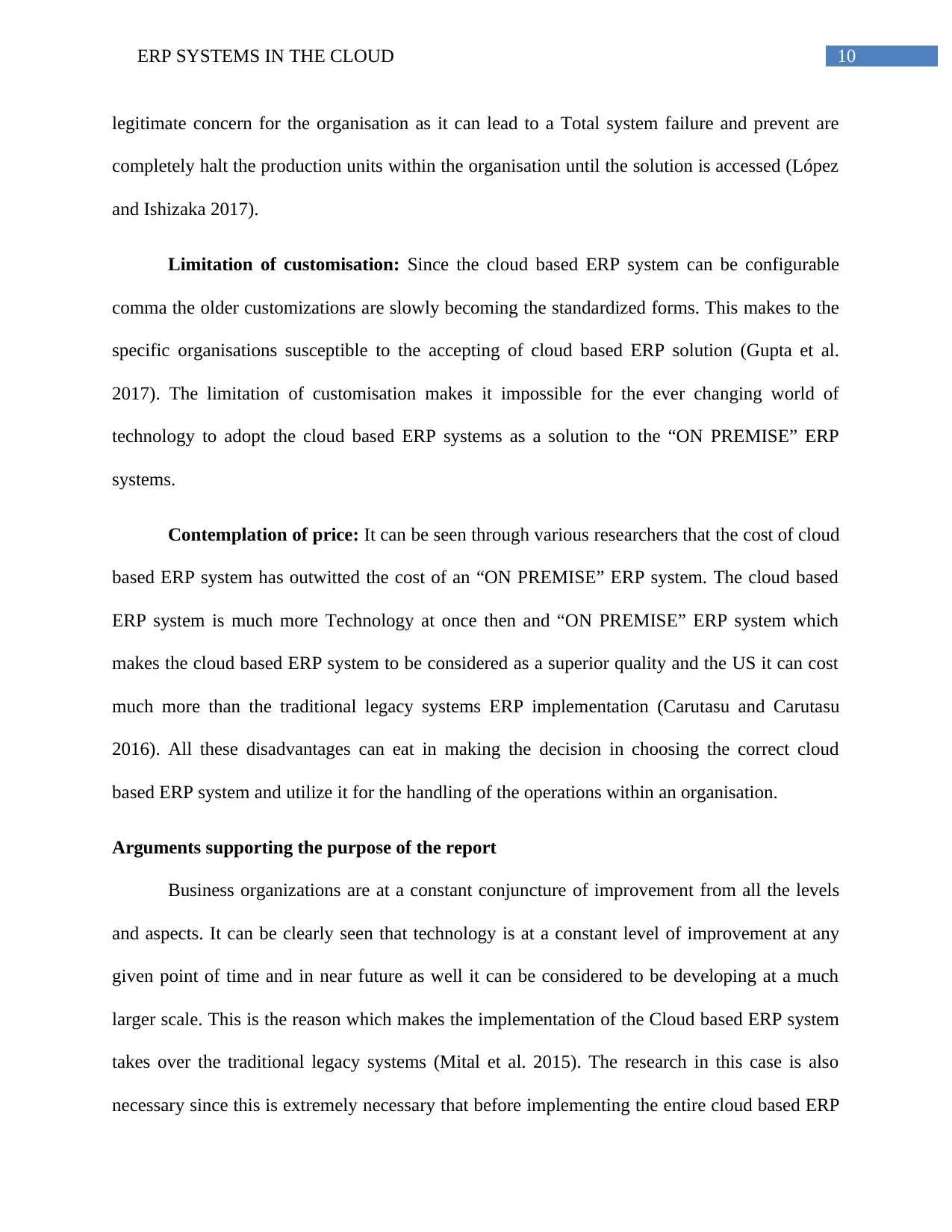
10ERP SYSTEMS IN THE CLOUD
legitimate concern for the organisation as it can lead to a Total system failure and prevent are
completely halt the production units within the organisation until the solution is accessed (López
and Ishizaka 2017).
Limitation of customisation: Since the cloud based ERP system can be configurable
comma the older customizations are slowly becoming the standardized forms. This makes to the
specific organisations susceptible to the accepting of cloud based ERP solution (Gupta et al.
2017). The limitation of customisation makes it impossible for the ever changing world of
technology to adopt the cloud based ERP systems as a solution to the “ON PREMISE” ERP
systems.
Contemplation of price: It can be seen through various researchers that the cost of cloud
based ERP system has outwitted the cost of an “ON PREMISE” ERP system. The cloud based
ERP system is much more Technology at once then and “ON PREMISE” ERP system which
makes the cloud based ERP system to be considered as a superior quality and the US it can cost
much more than the traditional legacy systems ERP implementation (Carutasu and Carutasu
2016). All these disadvantages can eat in making the decision in choosing the correct cloud
based ERP system and utilize it for the handling of the operations within an organisation.
Arguments supporting the purpose of the report
Business organizations are at a constant conjuncture of improvement from all the levels
and aspects. It can be clearly seen that technology is at a constant level of improvement at any
given point of time and in near future as well it can be considered to be developing at a much
larger scale. This is the reason which makes the implementation of the Cloud based ERP system
takes over the traditional legacy systems (Mital et al. 2015). The research in this case is also
necessary since this is extremely necessary that before implementing the entire cloud based ERP
legitimate concern for the organisation as it can lead to a Total system failure and prevent are
completely halt the production units within the organisation until the solution is accessed (López
and Ishizaka 2017).
Limitation of customisation: Since the cloud based ERP system can be configurable
comma the older customizations are slowly becoming the standardized forms. This makes to the
specific organisations susceptible to the accepting of cloud based ERP solution (Gupta et al.
2017). The limitation of customisation makes it impossible for the ever changing world of
technology to adopt the cloud based ERP systems as a solution to the “ON PREMISE” ERP
systems.
Contemplation of price: It can be seen through various researchers that the cost of cloud
based ERP system has outwitted the cost of an “ON PREMISE” ERP system. The cloud based
ERP system is much more Technology at once then and “ON PREMISE” ERP system which
makes the cloud based ERP system to be considered as a superior quality and the US it can cost
much more than the traditional legacy systems ERP implementation (Carutasu and Carutasu
2016). All these disadvantages can eat in making the decision in choosing the correct cloud
based ERP system and utilize it for the handling of the operations within an organisation.
Arguments supporting the purpose of the report
Business organizations are at a constant conjuncture of improvement from all the levels
and aspects. It can be clearly seen that technology is at a constant level of improvement at any
given point of time and in near future as well it can be considered to be developing at a much
larger scale. This is the reason which makes the implementation of the Cloud based ERP system
takes over the traditional legacy systems (Mital et al. 2015). The research in this case is also
necessary since this is extremely necessary that before implementing the entire cloud based ERP
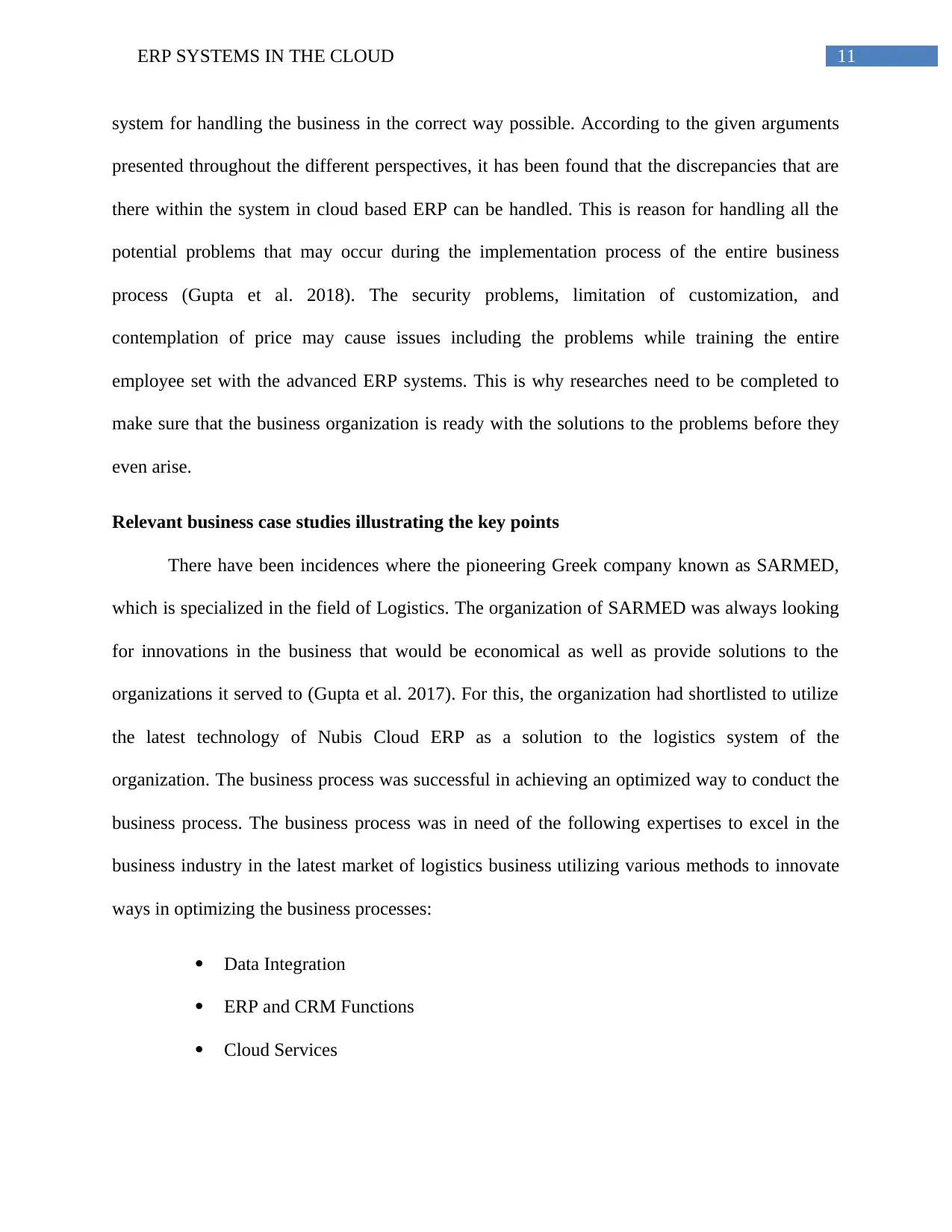
11ERP SYSTEMS IN THE CLOUD
system for handling the business in the correct way possible. According to the given arguments
presented throughout the different perspectives, it has been found that the discrepancies that are
there within the system in cloud based ERP can be handled. This is reason for handling all the
potential problems that may occur during the implementation process of the entire business
process (Gupta et al. 2018). The security problems, limitation of customization, and
contemplation of price may cause issues including the problems while training the entire
employee set with the advanced ERP systems. This is why researches need to be completed to
make sure that the business organization is ready with the solutions to the problems before they
even arise.
Relevant business case studies illustrating the key points
There have been incidences where the pioneering Greek company known as SARMED,
which is specialized in the field of Logistics. The organization of SARMED was always looking
for innovations in the business that would be economical as well as provide solutions to the
organizations it served to (Gupta et al. 2017). For this, the organization had shortlisted to utilize
the latest technology of Nubis Cloud ERP as a solution to the logistics system of the
organization. The business process was successful in achieving an optimized way to conduct the
business process. The business process was in need of the following expertises to excel in the
business industry in the latest market of logistics business utilizing various methods to innovate
ways in optimizing the business processes:
Data Integration
ERP and CRM Functions
Cloud Services
system for handling the business in the correct way possible. According to the given arguments
presented throughout the different perspectives, it has been found that the discrepancies that are
there within the system in cloud based ERP can be handled. This is reason for handling all the
potential problems that may occur during the implementation process of the entire business
process (Gupta et al. 2018). The security problems, limitation of customization, and
contemplation of price may cause issues including the problems while training the entire
employee set with the advanced ERP systems. This is why researches need to be completed to
make sure that the business organization is ready with the solutions to the problems before they
even arise.
Relevant business case studies illustrating the key points
There have been incidences where the pioneering Greek company known as SARMED,
which is specialized in the field of Logistics. The organization of SARMED was always looking
for innovations in the business that would be economical as well as provide solutions to the
organizations it served to (Gupta et al. 2017). For this, the organization had shortlisted to utilize
the latest technology of Nubis Cloud ERP as a solution to the logistics system of the
organization. The business process was successful in achieving an optimized way to conduct the
business process. The business process was in need of the following expertises to excel in the
business industry in the latest market of logistics business utilizing various methods to innovate
ways in optimizing the business processes:
Data Integration
ERP and CRM Functions
Cloud Services
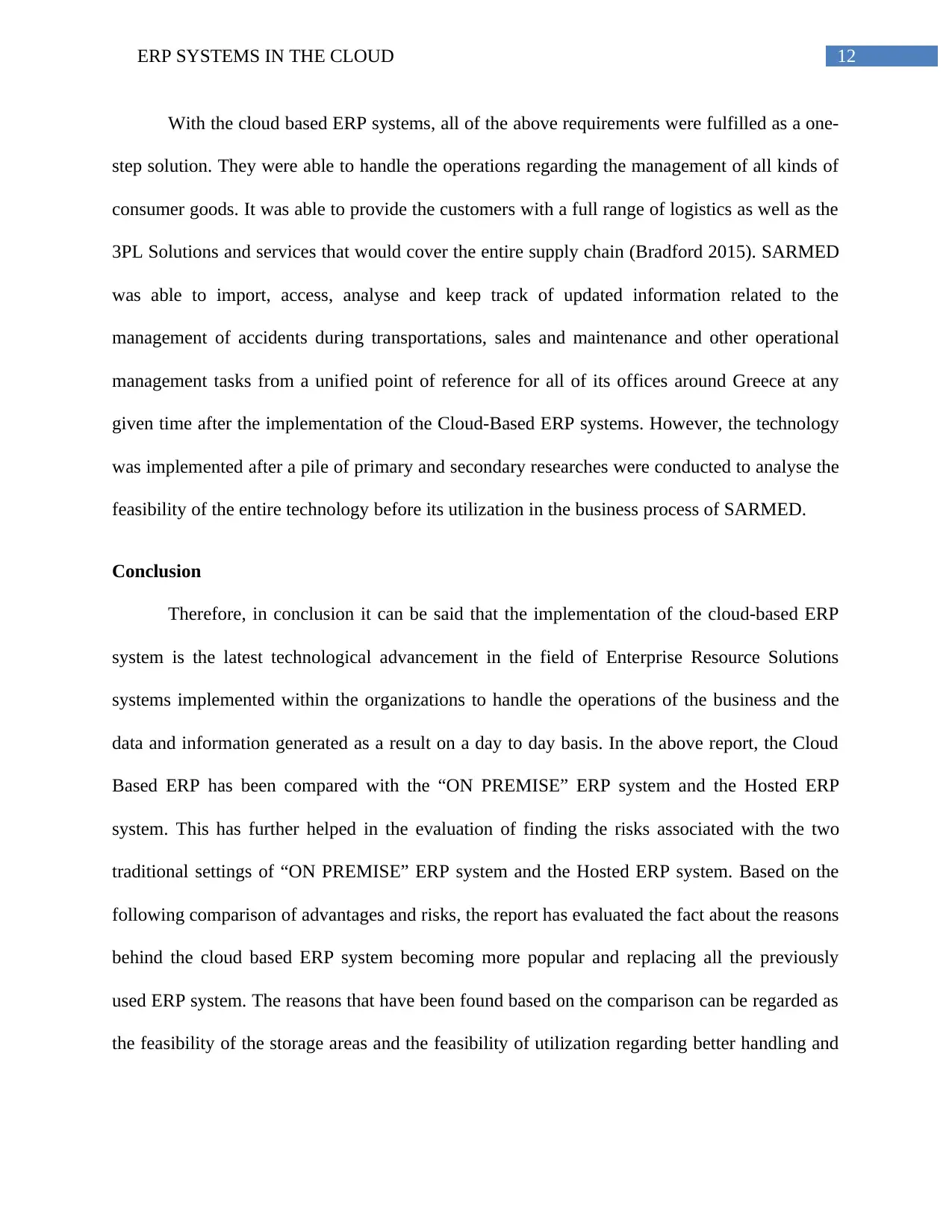
12ERP SYSTEMS IN THE CLOUD
With the cloud based ERP systems, all of the above requirements were fulfilled as a one-
step solution. They were able to handle the operations regarding the management of all kinds of
consumer goods. It was able to provide the customers with a full range of logistics as well as the
3PL Solutions and services that would cover the entire supply chain (Bradford 2015). SARMED
was able to import, access, analyse and keep track of updated information related to the
management of accidents during transportations, sales and maintenance and other operational
management tasks from a unified point of reference for all of its offices around Greece at any
given time after the implementation of the Cloud-Based ERP systems. However, the technology
was implemented after a pile of primary and secondary researches were conducted to analyse the
feasibility of the entire technology before its utilization in the business process of SARMED.
Conclusion
Therefore, in conclusion it can be said that the implementation of the cloud-based ERP
system is the latest technological advancement in the field of Enterprise Resource Solutions
systems implemented within the organizations to handle the operations of the business and the
data and information generated as a result on a day to day basis. In the above report, the Cloud
Based ERP has been compared with the “ON PREMISE” ERP system and the Hosted ERP
system. This has further helped in the evaluation of finding the risks associated with the two
traditional settings of “ON PREMISE” ERP system and the Hosted ERP system. Based on the
following comparison of advantages and risks, the report has evaluated the fact about the reasons
behind the cloud based ERP system becoming more popular and replacing all the previously
used ERP system. The reasons that have been found based on the comparison can be regarded as
the feasibility of the storage areas and the feasibility of utilization regarding better handling and
With the cloud based ERP systems, all of the above requirements were fulfilled as a one-
step solution. They were able to handle the operations regarding the management of all kinds of
consumer goods. It was able to provide the customers with a full range of logistics as well as the
3PL Solutions and services that would cover the entire supply chain (Bradford 2015). SARMED
was able to import, access, analyse and keep track of updated information related to the
management of accidents during transportations, sales and maintenance and other operational
management tasks from a unified point of reference for all of its offices around Greece at any
given time after the implementation of the Cloud-Based ERP systems. However, the technology
was implemented after a pile of primary and secondary researches were conducted to analyse the
feasibility of the entire technology before its utilization in the business process of SARMED.
Conclusion
Therefore, in conclusion it can be said that the implementation of the cloud-based ERP
system is the latest technological advancement in the field of Enterprise Resource Solutions
systems implemented within the organizations to handle the operations of the business and the
data and information generated as a result on a day to day basis. In the above report, the Cloud
Based ERP has been compared with the “ON PREMISE” ERP system and the Hosted ERP
system. This has further helped in the evaluation of finding the risks associated with the two
traditional settings of “ON PREMISE” ERP system and the Hosted ERP system. Based on the
following comparison of advantages and risks, the report has evaluated the fact about the reasons
behind the cloud based ERP system becoming more popular and replacing all the previously
used ERP system. The reasons that have been found based on the comparison can be regarded as
the feasibility of the storage areas and the feasibility of utilization regarding better handling and
Paraphrase This Document
Need a fresh take? Get an instant paraphrase of this document with our AI Paraphraser

13ERP SYSTEMS IN THE CLOUD
optimization of data within the ERP system according to the pile of data generated within the
organization each day.
optimization of data within the ERP system according to the pile of data generated within the
organization each day.
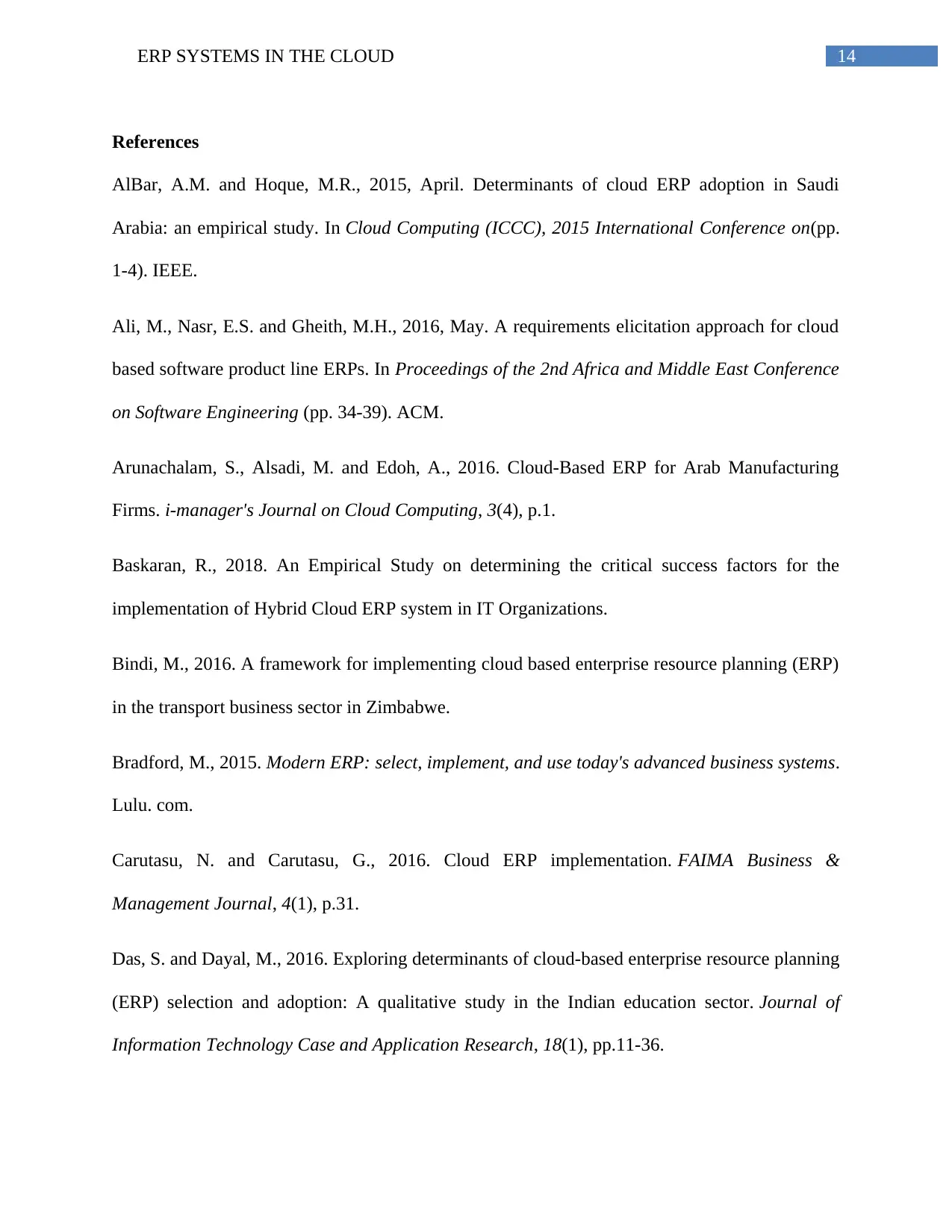
14ERP SYSTEMS IN THE CLOUD
References
AlBar, A.M. and Hoque, M.R., 2015, April. Determinants of cloud ERP adoption in Saudi
Arabia: an empirical study. In Cloud Computing (ICCC), 2015 International Conference on(pp.
1-4). IEEE.
Ali, M., Nasr, E.S. and Gheith, M.H., 2016, May. A requirements elicitation approach for cloud
based software product line ERPs. In Proceedings of the 2nd Africa and Middle East Conference
on Software Engineering (pp. 34-39). ACM.
Arunachalam, S., Alsadi, M. and Edoh, A., 2016. Cloud-Based ERP for Arab Manufacturing
Firms. i-manager's Journal on Cloud Computing, 3(4), p.1.
Baskaran, R., 2018. An Empirical Study on determining the critical success factors for the
implementation of Hybrid Cloud ERP system in IT Organizations.
Bindi, M., 2016. A framework for implementing cloud based enterprise resource planning (ERP)
in the transport business sector in Zimbabwe.
Bradford, M., 2015. Modern ERP: select, implement, and use today's advanced business systems.
Lulu. com.
Carutasu, N. and Carutasu, G., 2016. Cloud ERP implementation. FAIMA Business &
Management Journal, 4(1), p.31.
Das, S. and Dayal, M., 2016. Exploring determinants of cloud-based enterprise resource planning
(ERP) selection and adoption: A qualitative study in the Indian education sector. Journal of
Information Technology Case and Application Research, 18(1), pp.11-36.
References
AlBar, A.M. and Hoque, M.R., 2015, April. Determinants of cloud ERP adoption in Saudi
Arabia: an empirical study. In Cloud Computing (ICCC), 2015 International Conference on(pp.
1-4). IEEE.
Ali, M., Nasr, E.S. and Gheith, M.H., 2016, May. A requirements elicitation approach for cloud
based software product line ERPs. In Proceedings of the 2nd Africa and Middle East Conference
on Software Engineering (pp. 34-39). ACM.
Arunachalam, S., Alsadi, M. and Edoh, A., 2016. Cloud-Based ERP for Arab Manufacturing
Firms. i-manager's Journal on Cloud Computing, 3(4), p.1.
Baskaran, R., 2018. An Empirical Study on determining the critical success factors for the
implementation of Hybrid Cloud ERP system in IT Organizations.
Bindi, M., 2016. A framework for implementing cloud based enterprise resource planning (ERP)
in the transport business sector in Zimbabwe.
Bradford, M., 2015. Modern ERP: select, implement, and use today's advanced business systems.
Lulu. com.
Carutasu, N. and Carutasu, G., 2016. Cloud ERP implementation. FAIMA Business &
Management Journal, 4(1), p.31.
Das, S. and Dayal, M., 2016. Exploring determinants of cloud-based enterprise resource planning
(ERP) selection and adoption: A qualitative study in the Indian education sector. Journal of
Information Technology Case and Application Research, 18(1), pp.11-36.
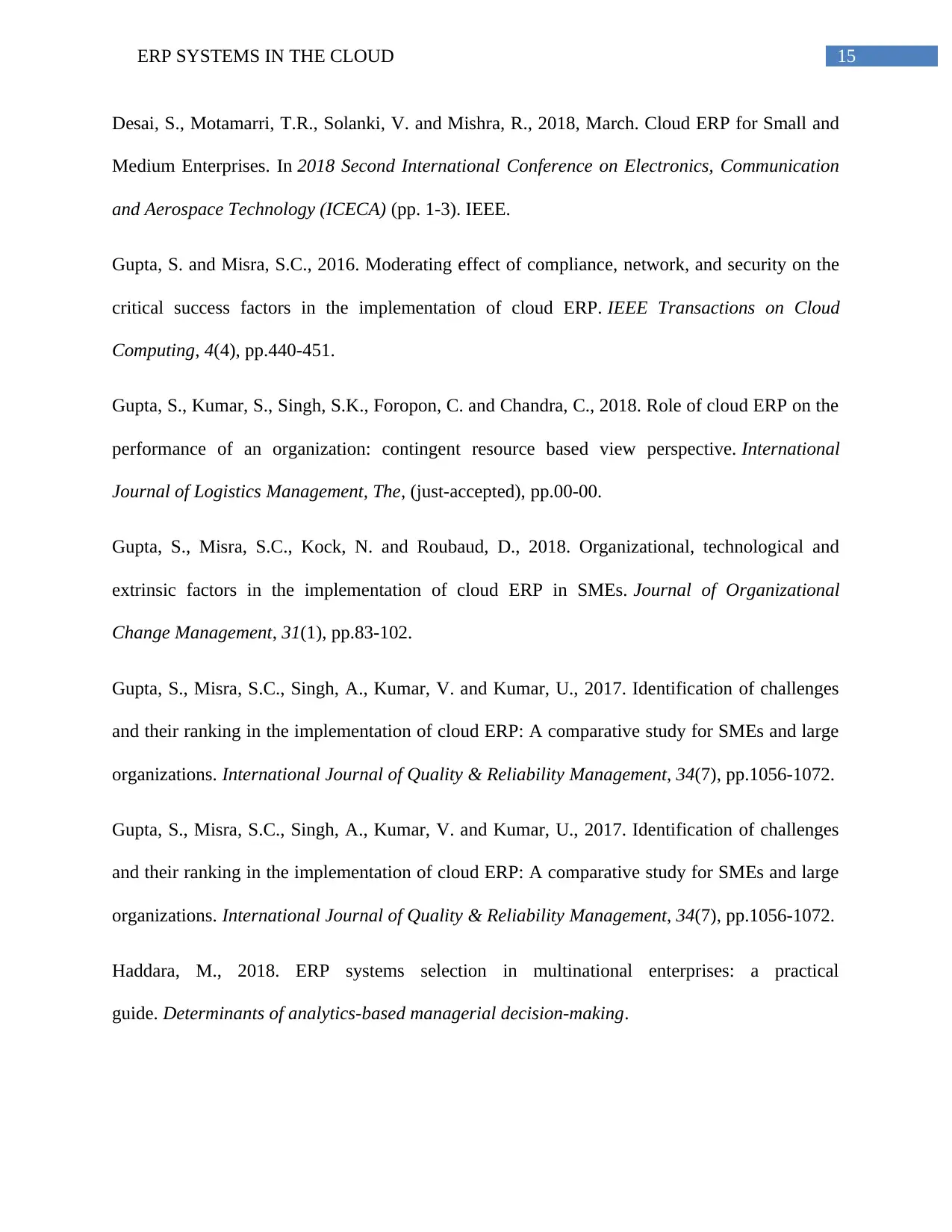
15ERP SYSTEMS IN THE CLOUD
Desai, S., Motamarri, T.R., Solanki, V. and Mishra, R., 2018, March. Cloud ERP for Small and
Medium Enterprises. In 2018 Second International Conference on Electronics, Communication
and Aerospace Technology (ICECA) (pp. 1-3). IEEE.
Gupta, S. and Misra, S.C., 2016. Moderating effect of compliance, network, and security on the
critical success factors in the implementation of cloud ERP. IEEE Transactions on Cloud
Computing, 4(4), pp.440-451.
Gupta, S., Kumar, S., Singh, S.K., Foropon, C. and Chandra, C., 2018. Role of cloud ERP on the
performance of an organization: contingent resource based view perspective. International
Journal of Logistics Management, The, (just-accepted), pp.00-00.
Gupta, S., Misra, S.C., Kock, N. and Roubaud, D., 2018. Organizational, technological and
extrinsic factors in the implementation of cloud ERP in SMEs. Journal of Organizational
Change Management, 31(1), pp.83-102.
Gupta, S., Misra, S.C., Singh, A., Kumar, V. and Kumar, U., 2017. Identification of challenges
and their ranking in the implementation of cloud ERP: A comparative study for SMEs and large
organizations. International Journal of Quality & Reliability Management, 34(7), pp.1056-1072.
Gupta, S., Misra, S.C., Singh, A., Kumar, V. and Kumar, U., 2017. Identification of challenges
and their ranking in the implementation of cloud ERP: A comparative study for SMEs and large
organizations. International Journal of Quality & Reliability Management, 34(7), pp.1056-1072.
Haddara, M., 2018. ERP systems selection in multinational enterprises: a practical
guide. Determinants of analytics-based managerial decision-making.
Desai, S., Motamarri, T.R., Solanki, V. and Mishra, R., 2018, March. Cloud ERP for Small and
Medium Enterprises. In 2018 Second International Conference on Electronics, Communication
and Aerospace Technology (ICECA) (pp. 1-3). IEEE.
Gupta, S. and Misra, S.C., 2016. Moderating effect of compliance, network, and security on the
critical success factors in the implementation of cloud ERP. IEEE Transactions on Cloud
Computing, 4(4), pp.440-451.
Gupta, S., Kumar, S., Singh, S.K., Foropon, C. and Chandra, C., 2018. Role of cloud ERP on the
performance of an organization: contingent resource based view perspective. International
Journal of Logistics Management, The, (just-accepted), pp.00-00.
Gupta, S., Misra, S.C., Kock, N. and Roubaud, D., 2018. Organizational, technological and
extrinsic factors in the implementation of cloud ERP in SMEs. Journal of Organizational
Change Management, 31(1), pp.83-102.
Gupta, S., Misra, S.C., Singh, A., Kumar, V. and Kumar, U., 2017. Identification of challenges
and their ranking in the implementation of cloud ERP: A comparative study for SMEs and large
organizations. International Journal of Quality & Reliability Management, 34(7), pp.1056-1072.
Gupta, S., Misra, S.C., Singh, A., Kumar, V. and Kumar, U., 2017. Identification of challenges
and their ranking in the implementation of cloud ERP: A comparative study for SMEs and large
organizations. International Journal of Quality & Reliability Management, 34(7), pp.1056-1072.
Haddara, M., 2018. ERP systems selection in multinational enterprises: a practical
guide. Determinants of analytics-based managerial decision-making.
Secure Best Marks with AI Grader
Need help grading? Try our AI Grader for instant feedback on your assignments.
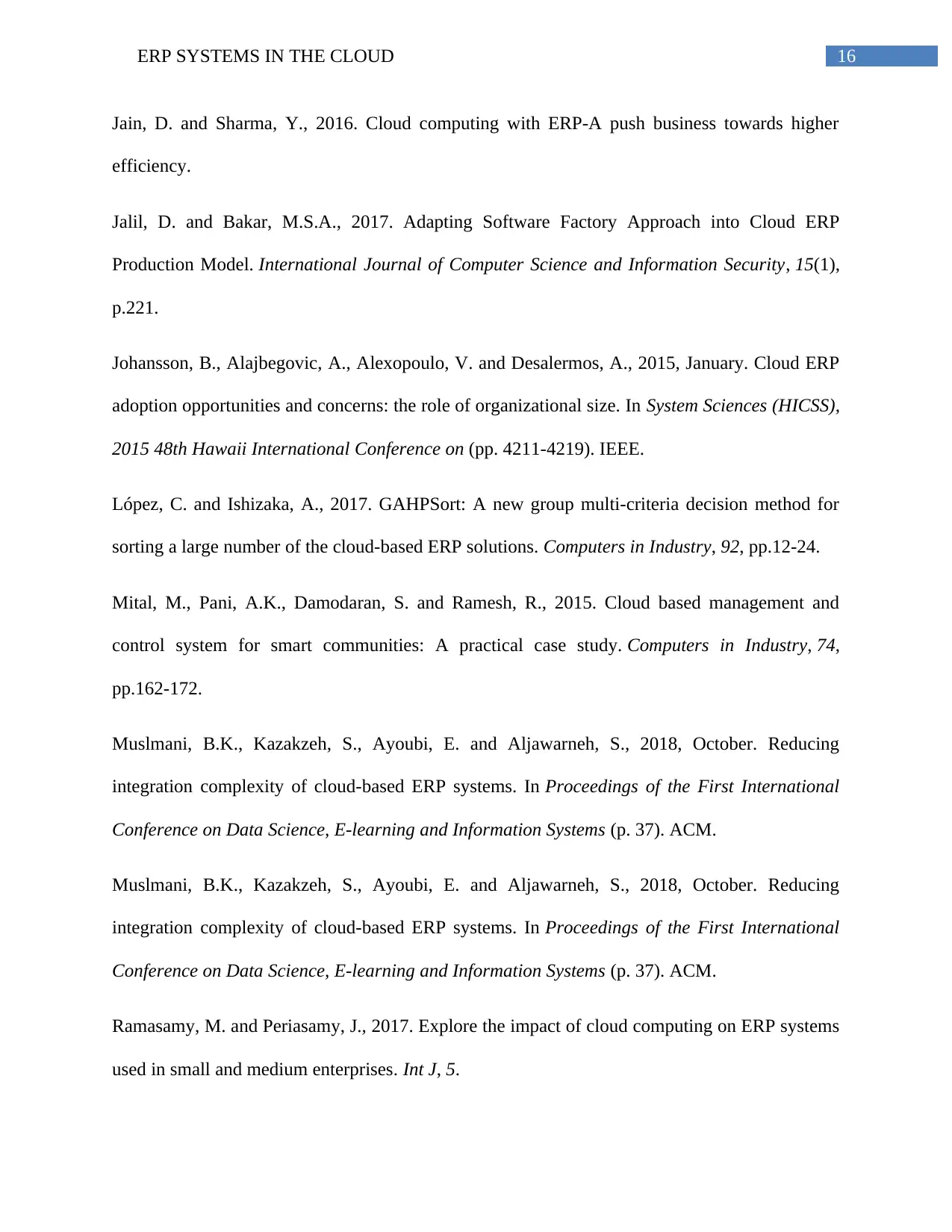
16ERP SYSTEMS IN THE CLOUD
Jain, D. and Sharma, Y., 2016. Cloud computing with ERP-A push business towards higher
efficiency.
Jalil, D. and Bakar, M.S.A., 2017. Adapting Software Factory Approach into Cloud ERP
Production Model. International Journal of Computer Science and Information Security, 15(1),
p.221.
Johansson, B., Alajbegovic, A., Alexopoulo, V. and Desalermos, A., 2015, January. Cloud ERP
adoption opportunities and concerns: the role of organizational size. In System Sciences (HICSS),
2015 48th Hawaii International Conference on (pp. 4211-4219). IEEE.
López, C. and Ishizaka, A., 2017. GAHPSort: A new group multi-criteria decision method for
sorting a large number of the cloud-based ERP solutions. Computers in Industry, 92, pp.12-24.
Mital, M., Pani, A.K., Damodaran, S. and Ramesh, R., 2015. Cloud based management and
control system for smart communities: A practical case study. Computers in Industry, 74,
pp.162-172.
Muslmani, B.K., Kazakzeh, S., Ayoubi, E. and Aljawarneh, S., 2018, October. Reducing
integration complexity of cloud-based ERP systems. In Proceedings of the First International
Conference on Data Science, E-learning and Information Systems (p. 37). ACM.
Muslmani, B.K., Kazakzeh, S., Ayoubi, E. and Aljawarneh, S., 2018, October. Reducing
integration complexity of cloud-based ERP systems. In Proceedings of the First International
Conference on Data Science, E-learning and Information Systems (p. 37). ACM.
Ramasamy, M. and Periasamy, J., 2017. Explore the impact of cloud computing on ERP systems
used in small and medium enterprises. Int J, 5.
Jain, D. and Sharma, Y., 2016. Cloud computing with ERP-A push business towards higher
efficiency.
Jalil, D. and Bakar, M.S.A., 2017. Adapting Software Factory Approach into Cloud ERP
Production Model. International Journal of Computer Science and Information Security, 15(1),
p.221.
Johansson, B., Alajbegovic, A., Alexopoulo, V. and Desalermos, A., 2015, January. Cloud ERP
adoption opportunities and concerns: the role of organizational size. In System Sciences (HICSS),
2015 48th Hawaii International Conference on (pp. 4211-4219). IEEE.
López, C. and Ishizaka, A., 2017. GAHPSort: A new group multi-criteria decision method for
sorting a large number of the cloud-based ERP solutions. Computers in Industry, 92, pp.12-24.
Mital, M., Pani, A.K., Damodaran, S. and Ramesh, R., 2015. Cloud based management and
control system for smart communities: A practical case study. Computers in Industry, 74,
pp.162-172.
Muslmani, B.K., Kazakzeh, S., Ayoubi, E. and Aljawarneh, S., 2018, October. Reducing
integration complexity of cloud-based ERP systems. In Proceedings of the First International
Conference on Data Science, E-learning and Information Systems (p. 37). ACM.
Muslmani, B.K., Kazakzeh, S., Ayoubi, E. and Aljawarneh, S., 2018, October. Reducing
integration complexity of cloud-based ERP systems. In Proceedings of the First International
Conference on Data Science, E-learning and Information Systems (p. 37). ACM.
Ramasamy, M. and Periasamy, J., 2017. Explore the impact of cloud computing on ERP systems
used in small and medium enterprises. Int J, 5.
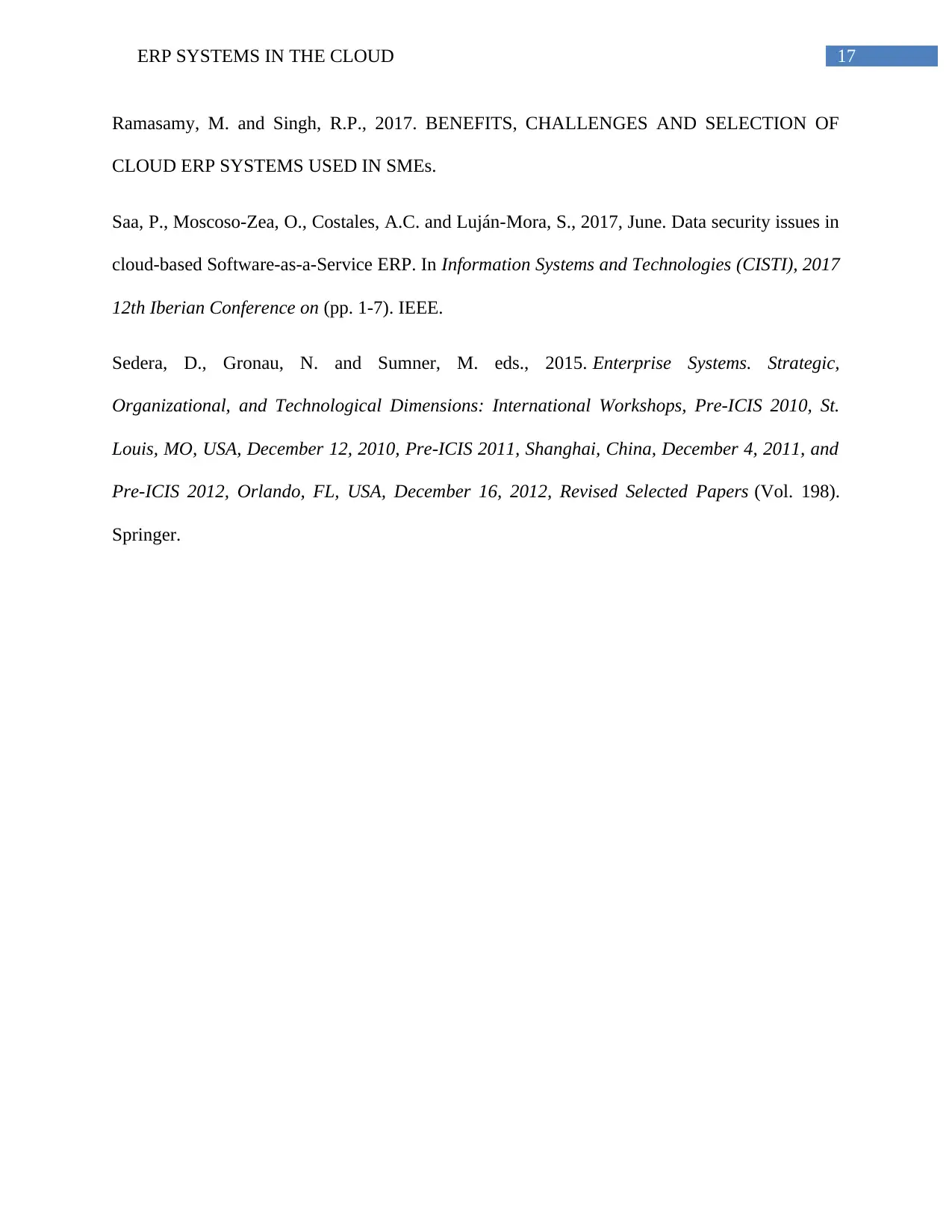
17ERP SYSTEMS IN THE CLOUD
Ramasamy, M. and Singh, R.P., 2017. BENEFITS, CHALLENGES AND SELECTION OF
CLOUD ERP SYSTEMS USED IN SMEs.
Saa, P., Moscoso-Zea, O., Costales, A.C. and Luján-Mora, S., 2017, June. Data security issues in
cloud-based Software-as-a-Service ERP. In Information Systems and Technologies (CISTI), 2017
12th Iberian Conference on (pp. 1-7). IEEE.
Sedera, D., Gronau, N. and Sumner, M. eds., 2015. Enterprise Systems. Strategic,
Organizational, and Technological Dimensions: International Workshops, Pre-ICIS 2010, St.
Louis, MO, USA, December 12, 2010, Pre-ICIS 2011, Shanghai, China, December 4, 2011, and
Pre-ICIS 2012, Orlando, FL, USA, December 16, 2012, Revised Selected Papers (Vol. 198).
Springer.
Ramasamy, M. and Singh, R.P., 2017. BENEFITS, CHALLENGES AND SELECTION OF
CLOUD ERP SYSTEMS USED IN SMEs.
Saa, P., Moscoso-Zea, O., Costales, A.C. and Luján-Mora, S., 2017, June. Data security issues in
cloud-based Software-as-a-Service ERP. In Information Systems and Technologies (CISTI), 2017
12th Iberian Conference on (pp. 1-7). IEEE.
Sedera, D., Gronau, N. and Sumner, M. eds., 2015. Enterprise Systems. Strategic,
Organizational, and Technological Dimensions: International Workshops, Pre-ICIS 2010, St.
Louis, MO, USA, December 12, 2010, Pre-ICIS 2011, Shanghai, China, December 4, 2011, and
Pre-ICIS 2012, Orlando, FL, USA, December 16, 2012, Revised Selected Papers (Vol. 198).
Springer.
1 out of 18
Related Documents
Your All-in-One AI-Powered Toolkit for Academic Success.
+13062052269
info@desklib.com
Available 24*7 on WhatsApp / Email
![[object Object]](/_next/static/media/star-bottom.7253800d.svg)
Unlock your academic potential
© 2024 | Zucol Services PVT LTD | All rights reserved.




